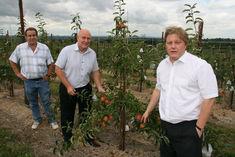
With a nomination for the 2012 Grower of the Year award and construction of an ultra-efficient £7.5 million packhouse set to get underway, 2012 is looking like an exciting year for Kent’s AC Goatham & Son.
Over the last five years, the family-run business has been busy planting Gala and Braeburn apples on the European system of wire work and bamboo canes, which means they can grow the trees up to three metres high and make better use of space. It’s already reaping the benefits, with its four-year-old Gala orchard winning an East Kent Fruit Society Orchard competition prize even before having grown to its full potential.
Ross Goatham, partner in the firm, says the business is embarking on a plan to replant its Cox orchards with Gala and Braeburn. “The obvious advantages of growing Gala or Braeburn over traditional varieties such as Cox are that you’re growing twice as much Braeburn on the same amount of ground. We can go higher and the varieties lend themselves to higher yields,” he explains.
“Given the returns that the supermarkets are giving us [for Cox] and the fact that most of it has to sell on promotion, it’s not financially viable to grow it any more. We’ve got a five-year plan to pretty much remove Cox from our farms. I think there’s a lot of growers in the industry that would like to be doing that, if finance were available. We’re seeing returns this season of between five and eight per cent down on last year. That doesn’t, as a rule, give the industry the confidence to reinvest, but without investment in more modern varieties the industry won’t see profitability.
“It’s a catch 22. You don’t want to invest because you don’t think you’ve got the money but if you don’t invest you’re not going to earn the money.”
Since beginning in 1980 with 45 acres, the business now has more than 1,000 acres of top-fruit in the ground. This includes 40 acres of Kanzi, 10 acres of Rubens and the Zari apple variety, for which it has exclusive rights to grow and import to the UK.
For the past two years, Zari was available exclusively to Morrisons, which AC Goatham & Son supplies, but the supermarket decided to stop selling it. As a seasoned supplier to Sainsbury’s, providing roughly 20 to 25 per cent of its British top fruit, Goatham approached the retailer with Zari slightly late on in the season, at the end of September.
Sainsbury’s picked it up and one of its advertising team decided they would try to promote it as an apple bobbing variety for Halloween. “It worked very well and it got a name for itself there,” Goatham says.
“Obviously next year we’ll be looking for it to move back to where it should be sold, before you get Gala and Braeburn and all those other varieties on the shelf. It’s by far and away a better apple than anything that’s available before you get into Gala at the end of September. That’s where we see its market - from early to mid-August through to the end of September.”
The business is hoping to supply something in the region of 40,000-50,000 cases of Zari to Sainsbury’s in 2012, far less than the 400,000 cases of Braeburn it hopes to provide. However, this is due to Braeburn, along with Gala and other varieties, selling from when they are harvested in September and October all the way through to April or May.
Goatham says the business is looking at lengthening the English season in line with the goal of Sainsbury’s, its biggest customer, to double the home-grown produce it stocks by 2020.
“At about the time the southern hemisphere would come on in about April or May, we’re looking to see if we can get Gala and Braeburn to go longer through growing methods,
harvest times and better, modern storage that means we can keep it longer,” Goatham explains. “There are major benefits there for both us and the consumer because food miles and carbon footprints are reduced by people eating English. It’s considerably cheaper than southern hemisphere because it doesn’t have the costs of the transport so it’s a win-win for everyone.”
This idea of win-win business appears to be ingrained in the morals of the family firm. It works loosely with a group of about 15 to 20 growers, none of whom are contracted, as all business is done on old-fashioned values and handshakes. “We agree to take their fruit and we give them the best return that we can for it. Over the past 10 or 15 years that we’ve been doing that most of our growers have invested in new varieties where I don’t expect the same to be true for all growers in co-operatives,” Goatham said. “We’ve always been a firm believer of being in control of our business. We’ve always been staunchly independent and we’ve always tried wherever possible to be dealing if not direct with our customers, supermarkets, as close as we can possibly get. We’re direct with Morrisons ever since they bought out Safeway [who it supplied], we serve Sainsbury’s through Orchard World and that’s working very well at the moment.”
By combining traditional, warm-hearted morals with the progressive business-sense to leave the past behind and invest in new technologies and products, AC Goatham & Son appears to be well-placed to take advantage of the drive towards increased British-grown produce in the supermarkets that looks poised to extend past Sainsbury’s and across the major multiples. -